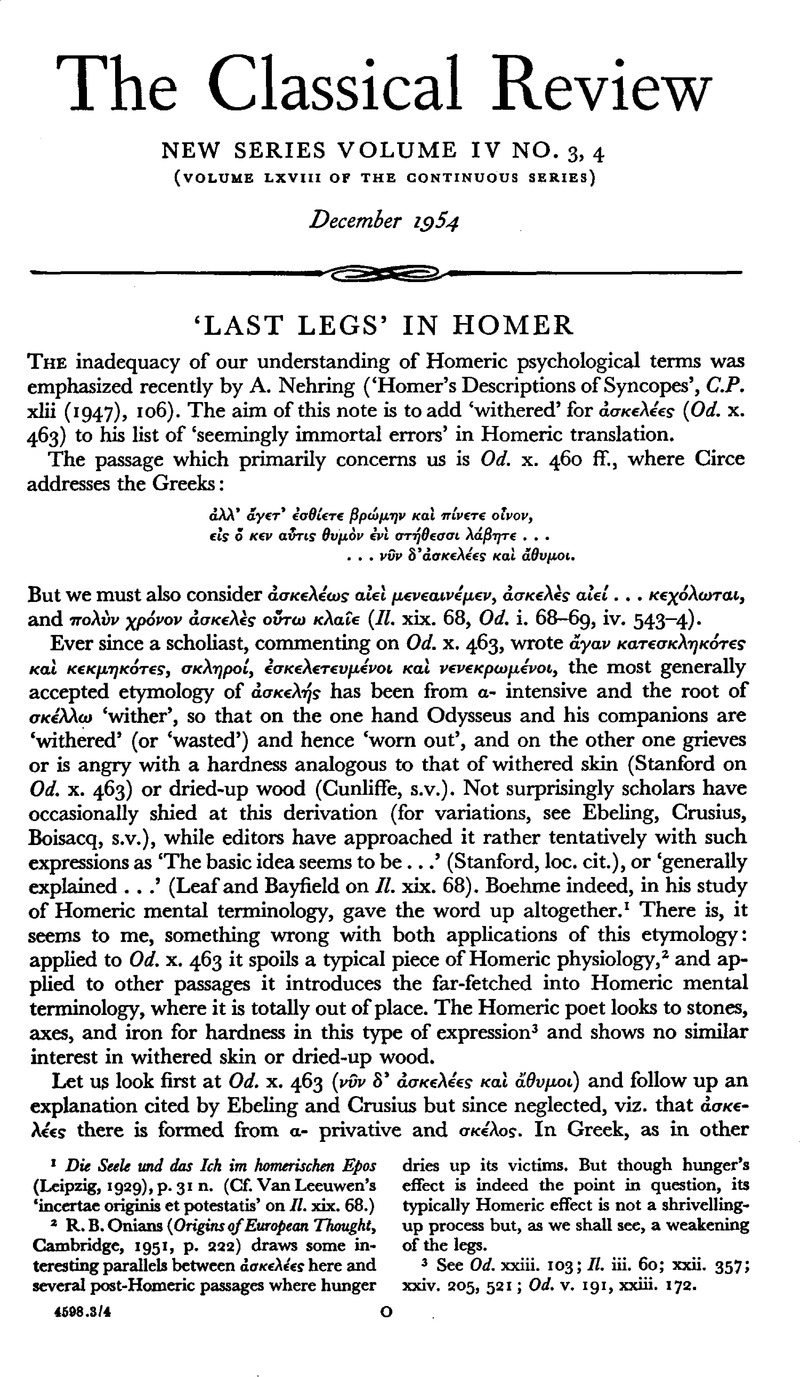No CrossRef data available.
Published online by Cambridge University Press: 13 February 2009

page 189 note 1 Die Seele und das Ich im homerischen Epos (Leipzig, 1929), p. 31 n. (Of. Van Leeuwen's ‘incertae originis et potestatis’ on Il. xix. 68.)Google Scholar
page 189 note 2 Onians, R. B. (Origins of European Thought, Cambridge, 1951, p. 322)Google Scholar draws some in-teresting parallels between ἀσκελέες here and several post-Homeric passages where hunger dries up its victims. But though hunger's effect is indeed the point in question, its typically Homeric effect is not a shrivelling-up process but, as we shall see, a weakening of the legs.
page 189 note 3 See Od. xxiii. 103; Il;. iii. 60; xxii. 357; xxiv. 205, 521; Od. v. 191, xxiii. 172.
page 190 note 1 For this development see Snell, , Die Ent-deckung des Geistes (Hamburg, 1948), pp. 29Google Scholar However we may view their origin, this principle undoubtedly applies to θυμός and νόος as well as to the other Homeric ‘mental organs’: each can denote a seat of mental activity or the activity itself. θυμός can be the seat of courage or desire (e.g. Il. xvii. 68, xiii. 386) or the emotions themselves (Il. xiii. 487, 775). Onians seems to overlook this funda-mental point: in the case of θυμός he concentrates on the ‘mental-organ’ usage to the exclusion of the equally significant ‘functional’ usage, so that θυμός is ‘not a function but a thing’ (op. cit., p. 44); and in the case of νόος he reverses his error, so that an example of its ‘functional’ meaning ‘seems to prove that in origin it did not express a permanent organ of the body’ (ibid., p. 82). The fallacy of this last point can be well illustrated by applying the same argument to φρόνες in the sense of ‘wisdom’ and making the same inference. (For similar failure to grasp the significance of this development see Schulze, Quaestiones Epicae, p. 314 n.)
page 190 note 2 Il. v. 597. Cf. later use of ἀγλωσαος ἀςπλαγχνος, ἀστομος and English ‘spineless’. ‘Handless’ for ‘clumsy’ is normal in Scots. ‘Footless’ for ‘drunk’ is a picturesque parallel common enough in parts of Ireland.
page 190 note 3 Nehring has established that what have long appeared to be exceptions to this rule in swoon-description are in fact mistranslations. In view of this, perhaps his own verdict on Il. v. 696 ff. needs revision. Having shown that κεκαφηότα there means ‘weakened’, not ‘having exhaled’, and that Ξὼγρει bears its usual meaning of ‘caught’, not ‘revived’, he then recommends for ![]() some such translation as ‘Boreas’ blast caught his weakened θυμόν (op. cit., pp. 113 ff. with conclusion at p. 118). But this would involve Sarpedon's loss of θυμός and put the expression Ξώγρει θυμόν on a par with death-phrases such as θυμόν whereas, as Nehring himself clearly shows, only a recurrence of Sarpedon's swoon is involved. The alternative he rejects (‘… caught him, weakened in his θυμός’, making p. 116) is surely the right one, and Sarpedon himself is in a vivid metaphor the wind's ‘living captive’. The correspondence in meaning which Nehring has established between
some such translation as ‘Boreas’ blast caught his weakened θυμόν (op. cit., pp. 113 ff. with conclusion at p. 118). But this would involve Sarpedon's loss of θυμός and put the expression Ξώγρει θυμόν on a par with death-phrases such as θυμόν whereas, as Nehring himself clearly shows, only a recurrence of Sarpedon's swoon is involved. The alternative he rejects (‘… caught him, weakened in his θυμός’, making p. 116) is surely the right one, and Sarpedon himself is in a vivid metaphor the wind's ‘living captive’. The correspondence in meaning which Nehring has established between ![]() and
and ![]() thus extends to their form as well: all are followed by an accusative of respect, and κεκαφηόγα is not after all the ‘odd man out’.
thus extends to their form as well: all are followed by an accusative of respect, and κεκαφηόγα is not after all the ‘odd man out’.